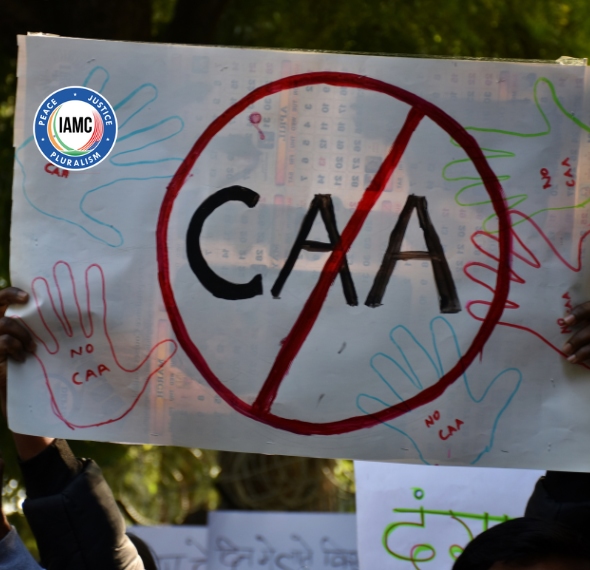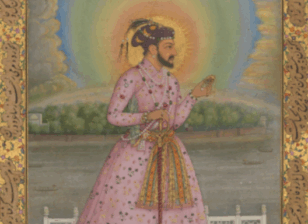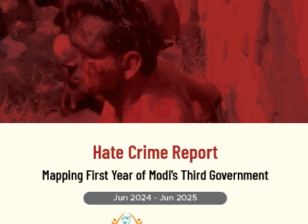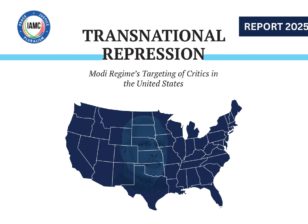How Hindu far-right groups crushed a pro-democracy resolution in Chicago city council
Washington, D.C. (October 4, 2023) —The Indian American Muslim Council (IAMC) organized a special event today to unveil a groundbreaking report that sheds light on the involvement of US-based Hindu far-right organizations in blocking a proposed resolution by the Chicago City Council in support of Indian Muslims. The report reveals their tactics, including employing hired lobbyists, collaborating with anti-Muslim entities, disseminating misinformation to influence council members, targeting an elected official, and concealing their activities behind a bogus secular front organization.
The report delves into the details exposed during a Facebook live conversation between Bharat Barai, a Hindu far-right leader based in Illinois, and Amitabh Mittal, the General Secretary of Vishwa Hindu Parishad America (VHPA), the American offshoot of the India-based Hindu militant group Vishwa Hindu Parishad (VHP). This conversation, livestreamed by VHPA, meticulously outlines the campaign aimed at thwarting a resolution that denounced the Indian government’s Citizenship Amendment Act (CAA) as “inherently discriminatory.”
In response to the resolution’s strong stance against anti-Muslim violence and discrimination in India, rightwing Hindu groups in Chicago launched a multi-pronged effort to put massive pressure on the city council to vote against the resolution by disguising their efforts under a false front. This was achieved by establishing a “secular” group called the US-India Friendship Council, which Barai claimed could be used to “argue that [the resolution] will impact the friendship between the two countries.”
Chicago-based Hindu rightwing elements then hired lobbyist Joe Moore, a former Chicago Alderman who played a decisive role in influencing city aldermen against the resolution. Additionally, in what the report describes as an “unethical alliance,” Amit Kumar, the then-Consul General of India in Chicago, was asked by the group to write letters pressuring the city council to oppose the resolution. Right-wing Hindu American influencers were also asked to write blog posts on a myriad of websites to bolster the group’s argument.
Four days before the vote, hundreds of WhatsApp messages were sent urging people to oppose the resolution. The group also created 17 different versions of email petitions, which would send all 50 aldermen emails with “one click,” resulting in each alderman receiving five to seven thousand emails.
Most alarmingly, the group worked closely with blatantly anti-Muslim groups such as the Middle East Forum, a widely known Islamophobic think tank, to spread the false narrative that the resolution was sponsored by “terrorist” groups. The groups in question, however, were well-established Muslim advocacy groups that were maliciously labeled by Barai and his associates with harmful Islamophobic terms.
Barai added that the US-India Friendship Council pushed the false claim that rising anti-Muslim violence in India “was an outright lie.”
“No such thing has happened. [The claim] was sponsored by CAIR, which is a terrorist organization. How many bought our argument we don’t know,” said Barai during the livestream.
The resolution’s lead sponsor, Ald. Maria Hadden, was also personally targeted and painted as a hateful bigot by the group, including by Barai himself, who wrote Hadden a comment targeting her sexual orientation. The group also protested outside of Hadden’s office, holding up signs with slogans such as “Maria: Stop spreading hate.”
Speaking at the special briefing on the implications of the exposé were several advocacy experts.
Hatem Bazian, a prominent scholar of religion, politics, and globalization, stated that the defeat of the resolution “was by means of utilizing structured Islamophobia,” and called for investigation into the US-India Friendship Council and the VHPA.
“We need to pose the question, are [these groups] acting as agents of a foreign government in the United States, interfering in the political process?” Bazian said. “I would say… to actually file a complaint against the VHP of America as well as the US India Friendship Council, and [investigate] whether they were actually acting as unregistered agents of a foreign government interfering in the democratic process in America.”
“For the past several years, we’ve witnessed these US-based organizations and activists with ties to Hindutva working to minimize criticism and dilute efforts to combat these Islamophobic or even anti-Dalit acts of intimidation or trends of discrimination,” said Robert McCaw, government affairs director of the Council on American–Islamic Relations (CAIR). “This isn’t just a matter of words and ideology. It’s about upholding the values of respect, diversity and justice that we as a nation hold dear.”
“Hindutva, at this point, is at the front of the line in terms of the worst forms of religious extremism,” said Salam Al-Marayati, president and co-founder of the Muslim Public Affairs Council. “We as Americans – not just as Muslims – but all Americans should be concerned.”
“There’s a convergence in the United States of some Hindutva inspired organizations or individuals and the Islamophobia industry,” said Todd Green, Director of Campus Partnerships for Interfaith America, commenting on the collaboration between Barai’s group and the Middle East Forum.
He added, “We have to pay a lot more attention to and start tracking the connections between these two… particularly when progressive politicians are being targeted with some of these campaigns and initiatives like they were in Chicago.”
“The current regime in India has a policy of using the diaspora in the US to advance their agenda domestically,” said John Prabhudoss, Chairman of the Federation of Indian American Christian Organizations (FIACONA). “What we should be focusing on is how Hindu nationalists are hijacking US policies and what impact this [interference] will have.”
Addressing the Hindu American community, Sunita Vishwanath, co-founder of the advocacy group Hindus for Human Rights, said, “My primary concern isn’t merely about those orchestrating these shameful and unscrupulous maneuvers. It’s about us, the broader Hindu community, and our predisposition to be swayed by such distortions… We are willfully blind to the atrocities taking place all around us, atrocities taking place in our name.”
expose 111




